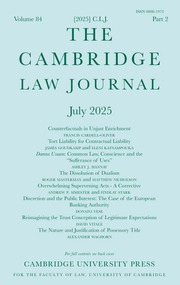(image source: Cambridge Core)
Abstract:
A troubling veil of mystery still shrouds the central institution of the British Constitution – the Crown. In this paper, I examine the modern utility of five historical doctrines: the doctrine of the “King's two bodies”; the doctrine that the Crown is a “corporation sole”; the doctrine that the King can “do no wrong”; the doctrine that (high) public offices are “emanations” of the Crown; and the doctrine that the Crown is “one and indivisible”. Using some insights from social ontology, the history of office in the Western legal tradition, and the sociology of role and status, I argue that the first four of these doctrines can be refashioned into a conception of the Crown as an office. An office is an enduring institutional entity to which individuals bear a relationship from time to time, but which is separate from any individual incumbent and is to be considered in legal analysis as a separate acting subject. Using the logic of office, official personality and official action, I distinguish between the Queen, the Crown, Her Majesty's Government and the Commonwealth and argue that together they provide a serviceable model of the modern British Constitution. The final doctrine, however, must be abandoned – the Crown is plural and divisible and this must be taken into account when using the Crown to reason about the UK's relationship to other constitutional orders.On the author:
Alexander von Humboldt Post-Doctoral Fellow, Humboldt Universität zu Berlin Centre for British Studies; Adjunct Research Fellow, University of Tasmania Faculty of Law. This paper is based on my doctoral dissertation, for which I was supported as a Poynton Scholar by the Cambridge Australia Trust and as a Burke Scholar (in 2013) by the University of Tasmania. I would like to thank a number of people, with the usual disclaimer as to responsibility for error, for helping me in various ways, at various times and in various capacities: my supervisor T.R.S. Allan, Will Bateman, Edward Cavanagh, Daniel Clarry, Gino Dal Pont, David Dyzenhaus, Paul Finn, Evan Fox-Decent, Mark Elliott, Denis Galligan, Brendan Gogarty, Andrew Gold, Andrew Halpin, Harshan Kumarasingham, Tony Lawson and the members of the Cambridge Social Ontology Group, Ewan Smith and the Oxford Public Law Discussion Group, Lionel Smith and Michael Stokes.
More information on Cambridge Core.


No comments:
Post a Comment